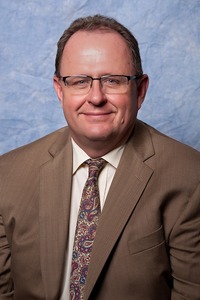How Broadlawns Medical Center Is Making Telehealth Accessible to Economically Disadvantaged Patients
// By Althea Fung //
 A safety net hospital in Des Moines, Iowa found a way to connect patients with needed behavioral health services using telehealth kiosks, leveraging community resources to provide broadband connectivity, private spaces, and support staff.
A safety net hospital in Des Moines, Iowa found a way to connect patients with needed behavioral health services using telehealth kiosks, leveraging community resources to provide broadband connectivity, private spaces, and support staff.
Telehealth usage has skyrocketed across the country. In the past year of the pandemic, the weekly number of behavioral health visits increased 25 percent on average compared with before COVID-19. This is due to expanded use of audio and video technology. But a study of insured patients published in Health Affairs found that in poorer communities, telehealth usage was significantly lower.

Steve Johnson, behavioral health administrator, Broadlawns Medical Center
“Prior to the pandemic, we built our patient portal to utilize telehealth services. But it reaches only part of our patient population,” says Steve Johnson, behavioral health administrator at Broadlawns Medical Center.
“When you’re dealing with populations in poverty, they may not have a video-capable phone. They may not have access to the kind of equipment or internet that you can just log on to a patient portal for telehealth.” A safety net hospital serving Polk County, Iowa, Broadlawns is required to provide needed medical care regardless of patients’ insurance status.
In Polk County, which includes Des Moines, about 15 percent of residents do not live in a household with broadband internet access. To ensure patients have access to health services, Broadlawns has launched a telehealth kiosk pilot program in a local community center, Urban Dreams.
“We looked at the ZIP codes of the patients we’re serving here. Urban Dreams is in the ZIP code where many of our patients live,” he says. Broadlawns has previously partnered with Urban Dreams to create unique training programs and has a therapist who works out of the community center. “We already share that space, so it was a natural evolution to offer other services in addition to therapy,” he says.
At the outset of the program, Broadlawns will limit the telehealth kiosk to existing behavioral health services patients but hopes to expand to other clinical areas and new behavioral health patients as well. The program will offer counseling and medication management.
“We think it will be a good option for people who may have difficulties with transportation, childcare, broadband access, or don’t want to go into a large hospital setting,” he says.
Creating a Secure Telehealth Kiosk
“When people are being forthcoming about some of the most sensitive parts of their life, we want them to feel comfortable. But this is a setting where a number of things can be happening,” Johnson says. Broadlawns worked with Urban Dreams to convert a room in the community center into a private clinical space. The team worked to cover interior windows so passersby cannot see patients.
The kiosk will have on-site staff to help patients use the patient portal to access the telehealth service. Additionally, the on-site therapist will be able to step in if a patient is experiencing a crisis or needs an in-person evaluation. The hospital’s information technology department will also be accessible if there are connectivity issues.
“We don’t want a patient walking away from a service because they can’t sign into an account,” he says.
“We know that poverty exacerbates mental health conditions. Many of these people are trying to figure out where their next meal is coming from. So we need to be able to help meet the patient’s needs in the most accessible manner.”
Even though Des Moines is a midsize city with more than 300,000 residents, Johnson says, there are still internet connectivity issues in poorer neighborhoods. The IT department also set up mobile hotspots at Urban Dreams to ensure continuous broadband connection in the area.
Johnson says his team also plans to make accommodations for patients who arrive late or completely miss their appointments, providing transportation to the hospital if medical attention is necessary.
Expanding the Pilot
Broadlawns planned to launch the program in May and, depending on the success of the program, it hopes to begin adding new locations throughout the Des Moines area by the summer. Johnson says the hospital has been in contact with the Des Moines public library staff to discuss similar options, and they are very interested.
“When we met at our main library in Des Moines, they brought up that the library is a location where many people who are at risk come during the day. They have computers and are already doing help desk types of services,” he says.
As the pilot progresses, Johnson also hopes to offer text message appointment scheduling and other services to help this underserved community.
“We know that poverty exacerbates mental health conditions. Many of these people are trying to figure out where their next meal is coming from. So we need to be able to help meet patients’ needs in the most accessible manner,” he says.
Althea A. Fung is a digital content strategist and health care journalist. She is a senior editor at NewYork-Presbyterian.
